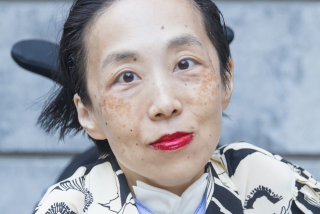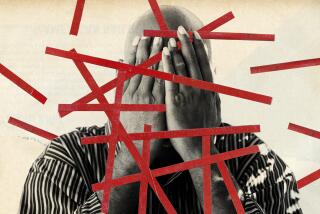PERSPECTIVE ON ASSISTED SUICIDE : Walk a Mile in My Wheelchair : Quality of life consists of more than the physical; just because someone is disabled doesn’t mean his life has no value.
- Share via
If I, a 33-year-old married Harvard graduate with a new baby daughter, threatened to hurl myself off a tall building, would an emergency medical team respond? And if one did, would I be offered counseling--or carbon monoxide?
I was born with a neuromuscular disability and use a wheelchair. With all the recent euthanasia news--Dr. Jack Kevorkian’s acquittal and new trial and two federal court decisions favoring assisted suicide--I don’t feel safe.
It may be constitutionally protected, but the right to die seems dangerous to those of us who are not ideal physical specimens.
I am not terminally ill. Both the April 2 decision by the 2nd U.S. Circuit Court of Appeals in New York and the March 6 decision by the 9th U.S. Circuit Court of Appeals in San Francisco permit assisted suicide only for “a competent, terminally ill adult.” But Judge Stephen Reinhardt, writing for the majority in San Francisco, went on to say that death is more humane than continuing to live in “a childlike state of helplessness.”
They are not the same thing, though, this “state of helplessness” and being terminally ill. I have lived my whole life in such a state, needing assistance for eating, bathing, using the toilet. The humane thing to do is to help, not presume that my life isn’t worth living.
Kevorkian isn’t concerned with whether his clients’ conditions are terminal. On Aug. 4, 1993, for example, after his medical license had been revoked in Michigan and California and Michigan’s law against assisted suicide was in effect, Kevorkian aided the suicide of a 30-year-old who had recently become quadriplegic. Thomas Hyde wasn’t terminally ill, not really ill at all. Nor was he in pain. His condition was roughly the same as mine.
In the new trial, Kevorkian stands accused in the death of Marjorie Wantz, 58, who, Kevorkian admits, was not terminally ill. Rather, Wantz “claimed after a series of surgeries to be suffering intense vaginal pain that they [prosecutors] contend was psychosomatic,” the New York Times reported.
Granted, the people seeking assisted suicide want to die. And I believe in autonomy and self-determination; I am pro-choice. But what happens when able-bodied people attempt suicide? Why is their choice considered irrational? Why is a disabled person’s suicide choice more readily judged sane?
Kevorkian would argue that he is ending suffering for people with no options. Tell that to Stephen Hawking, the physicist who has advanced amyotrophic lateral sclerosis, writes best-selling books, travels around the world and recently divorced his wife to marry his nurse. To say someone has no options just because doctors are stumped is medical arrogance. Quality of life is determined by more than physical condition.
To be sure, not everyone can be a Stephen Hawking. Which is precisely why Kevorkianism is so frightening. Does Kevorkian realize how hard it is for the average disabled person to feel valued in this society?
What I’m calling for is clarity. The right to die is appropriate only if it isn’t clouded by fear and ignorance of disabilities. The dangers are potentially enormous. Euthanasia, after all, was one step toward the Holocaust. If doctors, judges and juries continue to cast doubts on the worth of people with disabilities, I fear for the one in six Americans (according to the census) who has a disability. If Kevorkian is truly concerned about us, why doesn’t he join the cause of disability rights?
More to Read
Sign up for Essential California
The most important California stories and recommendations in your inbox every morning.
You may occasionally receive promotional content from the Los Angeles Times.













